Учебное пособие по англ языку. Анатомия человека
 Скачать 4.92 Mb. Скачать 4.92 Mb.
|
ПРЕДИСЛОВИЕДанное учебное пособие предназначено для студентов медицинских колледжей, продолжающих изучение английского языка. В основе пособия лежит принцип коммуникативной направленности и положения современной методики. Пособие помогает решать следующие задачи: 1) расширять словарный запас, развивать речевые навыки и умения в основных видах речевой деятельности в пределах изучаемой тематики и на лексико-грамматическом материале типичном для медицинской литературы; 2) активизировать познавательные и коммуникативные ресурсы личности; 3) формировать у студентов умения использовать английский язык как средство профессионального общения, получения информации и самообразования. Тематика текстового материала соответствует требованиям программы и обусловлена уровнем профессиональной подготовки специалиста. Пособие включает занятия по следующим разделам:
Структурной единицей учебного пособия является занятие, включающее текст по определенной теме и упражнениями к нему. Каждый текст включает основной лексико-грамматический материал и предназначен для развития умений всех видов чтения. Рекомендуется использовать тексты преимущественно для самостоятельной работы студентов дома. Контроль осуществляется на занятии. К каждому тексту разработан комплекс упражнений. Предтекстовые и послетекстовые упражнения предназначены для введения, закрепления, автоматизации лексико-грамматического материала, для формирования соответствующих навыков и развития речевых умений. Предлагаемые упражнения стимулируют интеллектуальную активность, способствуют развитию понимания, активно подключают мыслительные операции (анализ, синтез, сравнение, обобщение, классификация), включают в работу визуальную и вербальную память, поддерживают интерес и работоспособность, стимулируют процесс личностного роста. Творческий характер упражнений превращает учебную деятельность по изучению материала занятия в личностно значимый процесс, создавая условия для формирования стойкой мотивации изучения английского языка. Пословицы, фразеологические выражения, стихотворные формы придают упражнениям высокую смысловую нагрузку и вызывают интерес студентов к изучаемому материалу. Система контроля реализуется в виде текущего контроля на каждом занятии. Объектами контроля являются уровень сформированности лексико-грамматических навыков и речевых умений в основных видах речевой деятельности. Данное учебное пособие позволяет преподавателю организовывать интенсивную, самостоятельную и творческую деятельность студентов, направленную на решение конкретных познавательных, профессионально важных проблем, побуждающих их к поиску и открытию новых знаний. Пособие реализует принципы личностно-ориентированного подхода в обучении с целью повышения качества подготовки специалиста в рамках изучения дисциплины «Английский язык». 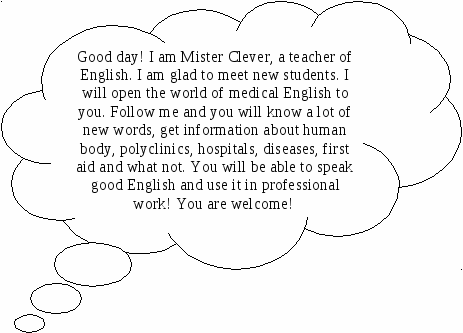 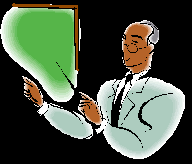 РАЗДЕЛ I. STUDENT’S LIFEЦели раздела В результате изучения теоретического материала по темам данного раздела вы должны знать:
уметь:
Обучающие цели:
TOPIC 1. MEETING PEOPLE 1.Fill in the gaps in the dialogues. Roleplay them.
a. Good morning. Good morning. ___________ to meet you. Nice to meet you ___________. b. Hello. ____________? Fine, thank you. And you? I am __________ too. c. Good bye. Bye. ________________. 2.Match the questions and the answers.
3.Introduce yourself. Complete the sentences.
4.Look at the pictures and write down the English equivalents for the given adjectives.
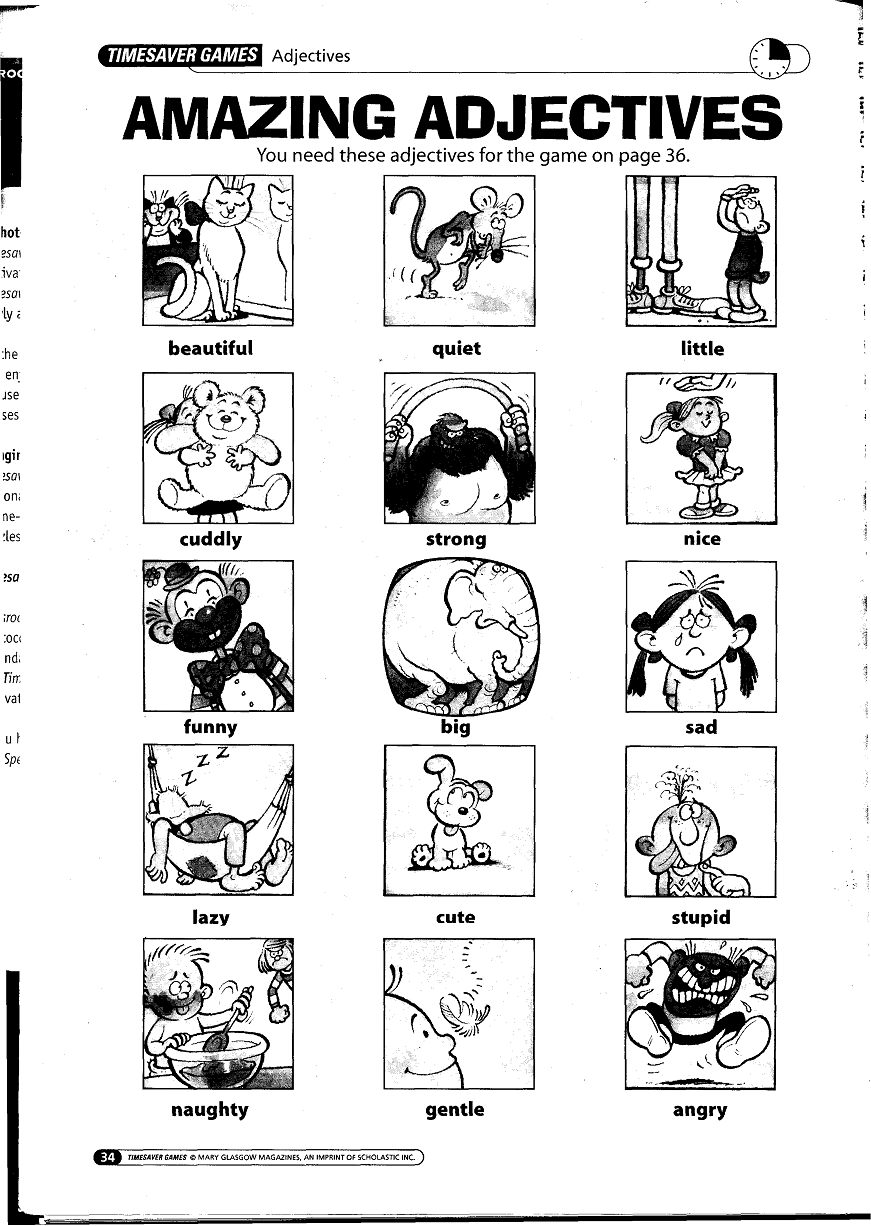  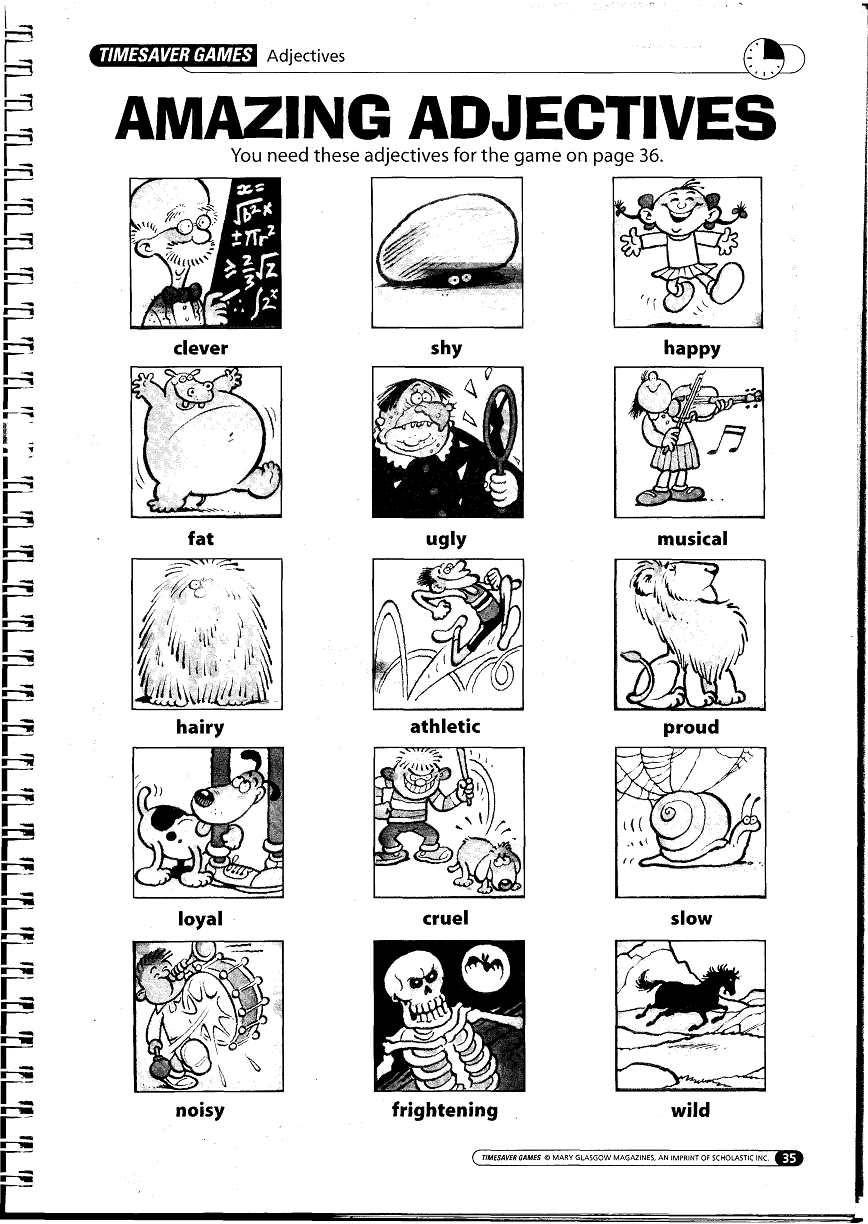  5.Use these adjectives and speak about your character and the character of your friends and relatives.
6.All people differ from each other in the way they look. These words help you to describe people. Match the words.
7.Describe these people using the words from task 6.
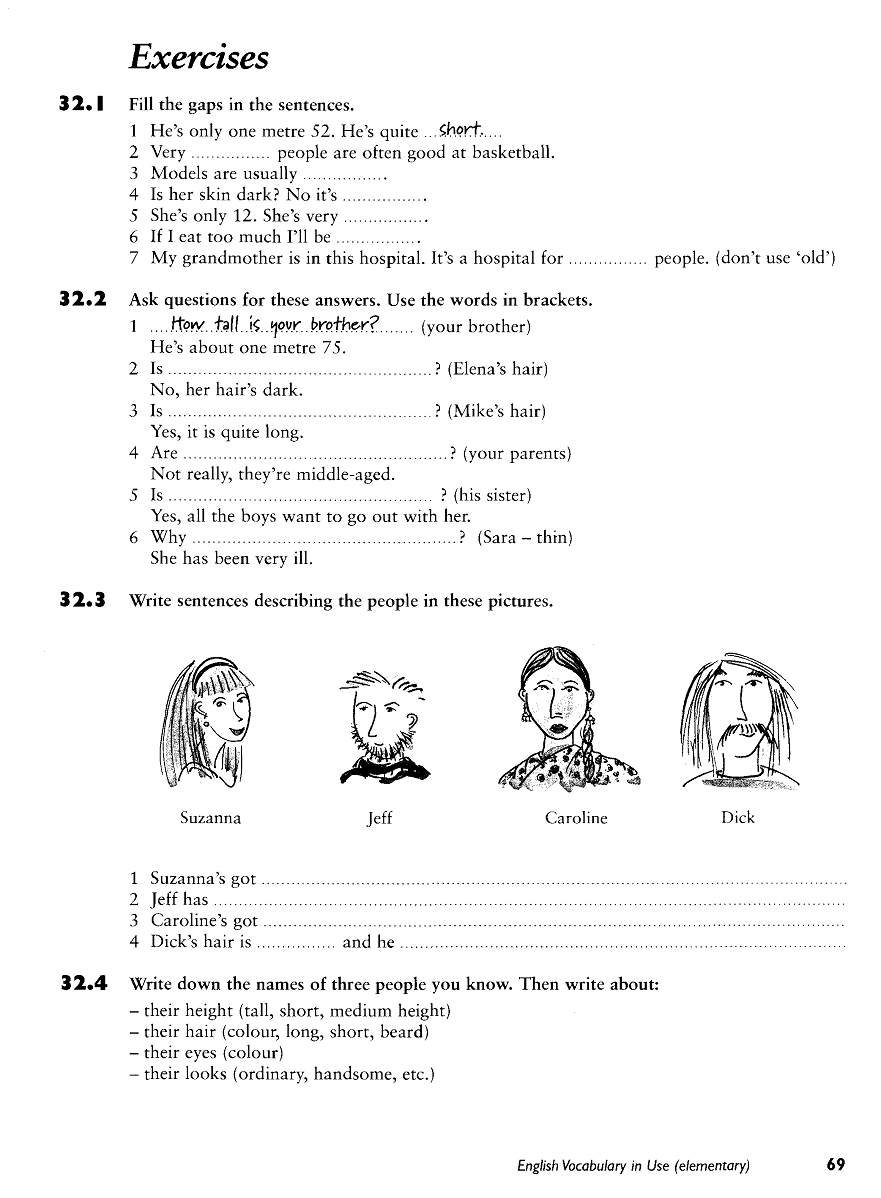
8.Look at the pictures and say what you usually wear when it is warm or cold. When it is warm I usually wear ________________________ . When it is cold I usually wear __________________________. 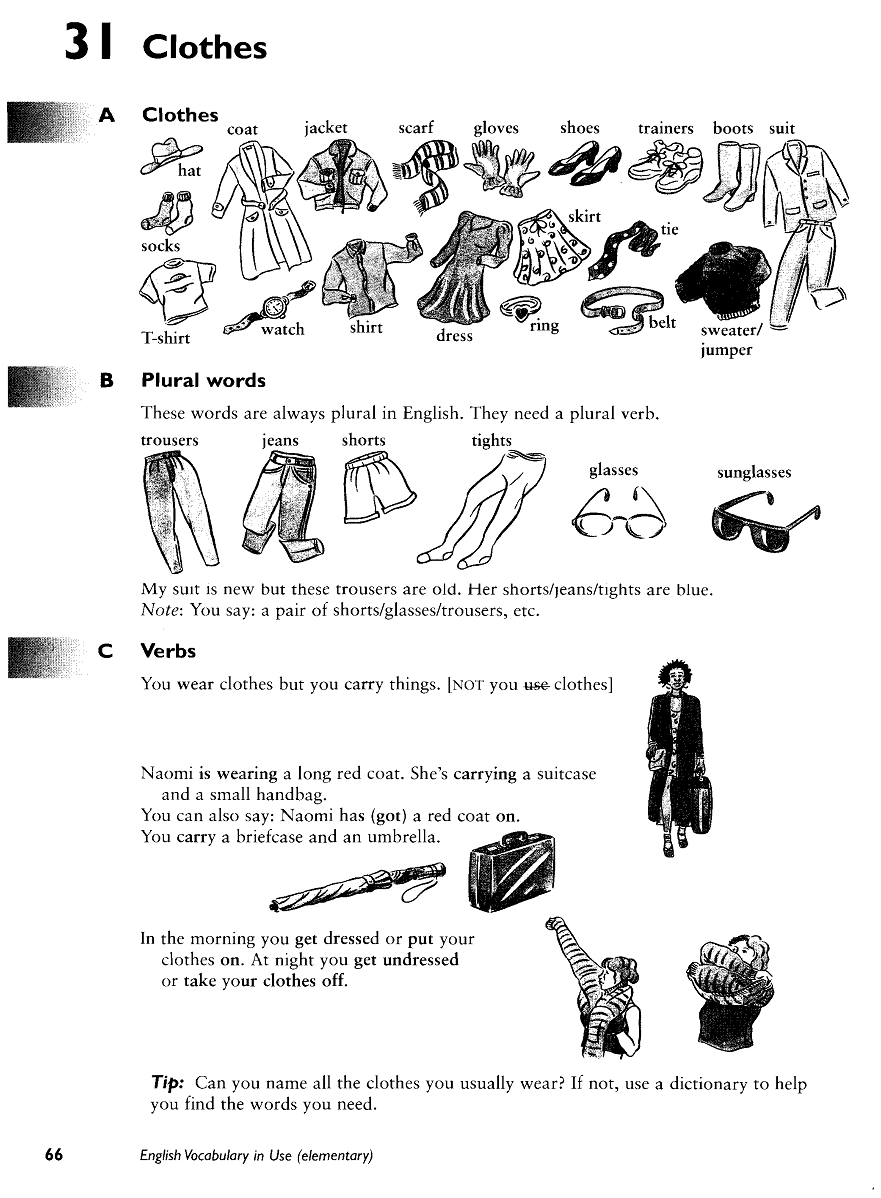 TOPIC 2. MY DAY 1.Fill in the gaps with the missing days of the week. Translate the rhyme into Russian. Solomon Grundy Solomon Grundy, Born on ______________, Christened on __________, Married on ____________, Took ill on ____________, Worse on _____________, Died on ______________, Buried on ____________. This is the end of Solomon Grundy. 2. Read the everyday activities and put them into the necessary columns. wash myself, attend lectures, sweep the floor, clean the teeth, have breakfast, prefer a cup of coffee (tea) and a sandwich, start (finish) studies, do ironing, watch (sport, films, shows) on TV, go to college, get up at 7 o’clock, get hungry, study different subjects, buy food, have dinner, come home from the college, read books, have a rest, have a party, sit at the café, go to the cinema, do homework, have some free time, do the work about the house, make dinner, put the clothes on, dust the furniture, clean the carpet, relax in a rock club, go shopping, do make-up, go for a walk with my friends, make the bed, play computer games, do sport, go to fitness club, have supper, talk on the phone with friends, go to bed, listen to music.
3. Answer the questions
4.Fill in the gaps My working day I’d like to tell you about my working day. On week days I usually … … at six o’clock. I make the bed, … …, clean the teeth, … … … and go to the kitchen to … … . I prepare breakfast for my own. For breakfast I … coffee and a sandwich. Then I … … . It is far away from my house and I go there by bus. I have studies from two till six o’clock. I … … ... at the college. Then I come home and … … . I like a big dinner, because when I come home from the college I am very hungry. After my dinner, I … … for a couple of hours and then I … … … . If I have some spare time I do some work about the house. I sweep the floor, … … and clean the carpets with the vacuum-cleaner. Sometimes my mother asks me to go shopping and … … . Then I have free time. I go for a walk with my friends or … …, or read books, or play my favourite computer games. Then I … … with my family. I like evenings very much, all members of our family get together after work and have opportunity to talk and discuss our family affairs. I usually … … … at about eleven o’clock, sometimes even at midnight. 5. Tell about the day of your dream. TOPIC 3. HOBBIES 1.Group the words according to the titles as quick as possible. Who is the winner?
Painting, cooking, bird watching, running, sewing, reading, stamp and coin collecting, gardening, golf, photography, traveling, poem writing, fishing, hunting, billiards, belly dancing, bowling, food decorating, shopping. 2.Read the text about hobbies and translate it. Hobbies Hobbies are things we do when we are free. But people are different all around the world and their hobbies are not the same either. Some people like to collect things – from stamps and coins to pictures and cars. One man I know has a whole park of cars. Probably it’s funny to spend money and spare time on such things. But all famous museums exist thanks to this strange people. Many prefer to watch TV and go to the cinema or to the theatre but reading is still popular. Not a few go hunting and fishing. Many people keep pets. There is also a new tendency today: people like to do things with their own hands. You see DIY (do it yourself) shops in every town. However sport is still the leader. People do sports, talk sports, write and read about sports. My cousin Julian is a real expert on sports. He gives advice how to win a game of tennis or score a goal. He strongly supports all his friends who want to keep fit. Julian explains to them how to jog and lift weights. He laughs at those people who prefer alternative hobbies such as gardening or amateur drama groups because they care little about their health. But he himself never plays sports. He is a football fan and watches all matches on TV. You see, he is not a practitioner. He is a theorist. He is a coach-potato. 3.Answer the questions
4.Say if the sentences are true or false.
5.Translate into English.
6.Tell about your hobby. |

